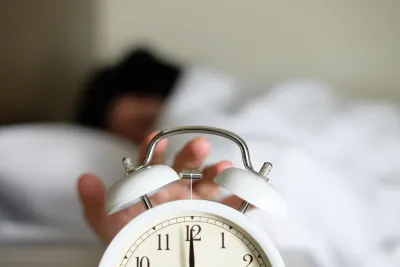The Effects of Oversleeping on Your Health and Well-being
Chilipad Editorial Team • Jun 12, 2024

Key Takeaways
While sleep is vital, consistently sleeping too much can throw off your body’s balance and signal deeper health concerns.
- Regular oversleeping has been associated with health risks, including heart disease, obesity, and type 2 diabetes.
- Too much sleep can affect mental health, with links to higher rates of depression and anxiety.
- Sleeping far beyond your body’s needs can disrupt your circadian rhythm, making sleep timing feel unpredictable.
- Ongoing oversleeping may point to an underlying sleep disorder or medical issue that’s worth discussing with a healthcare provider.
- Finding the right balance between sleep duration and sleep quality supports long-term health and daily performance.
We’ve all heard the phrase, “too much of a good thing.”
Consuming too much food can cause weight gain, eating too much candy can lead to cavities, and even drinking too much water can be potentially harmful.
Sleeping longer than one should on a regular basis can be too much of a good thing as well.
Everyone knows that sleep plays a crucial role in our overall health, and not getting enough sleep is never good. Achieving enough sleep, typically at least seven hours nightly, is essential for maintaining health and avoiding the negative effects of both too little and too much sleep. Less sleep can cause chronic diseases and make anyone feel sluggish and irritable throughout the day.
However, they may not realize that too much sleep can be dangerous to their overall health.
What is Oversleeping?
Oversleeping, known as “hypersomnia,” occurs when a person sleeps more than nine hours within a 24-hour period, often due to excessive sleep. This amount of sleep varies from person to person. For example, some individuals may only need six hours while others require a lot more.
Oversleeping doesn’t affect individuals that need an extra hour or two of sleep and has no impact on those who need the extra sleep after a long trip, staying out late, procrastinating, recovering from illness, or even jet lag.
However, it often serves as a symptom of underlying sleep disorders, including conditions like idiopathic hypersomnia and narcolepsy, which involve excessive sleepiness and difficulty waking up.
Oversleeping takes place when somebody gets more sleep than their body needs, such as sleeping for 11 to 13 hours each night.
Get Deeper and Restorative Sleep
Water has higher thermal conductivity than air, allowing for more efficient cooling and heating. Our cooling mattress pads allow you to find the right temperature, ranging from 55-115º, to improve your deep sleep and wake up feeling rested.
Is Too Much Sleep a Bad Thing?
It's important to note that the amount of sleep an individual needs can vary based on factors such as age and gender. While there isn't a one-size-fits-all recommendation for sleep duration, it's generally accepted that individual sleep needs differ.
Additionally, occasional short naps or irregular sleep patterns are often considered to have minimal negative impact on health.
Hours of Sleep Needed by Age
How many hours a night of sleep do we need? Well, the recommendations vary from person to person.
Below are recommendations for the amount of sleep needed:
- Infants (ages 0 - 3 months): 14 -17 hours per day
- Infants (ages 4 - 11 months): 12 - 15 hours per day
- Toddlers (1 - 2 years old): 11 - 14 hours per day
- Preschool (3 - 5 years old): 10 - 13 hours per day
- School-Aged Children (6 - 13 years old): 9 - 11 hours per day
- Teenagers (14 - 17 years old): 8 - 10 hours per day
- Majority of Adults: 7 - 9 hours per day
- Older Adults (65+): 7 -8 hours of sleep at night
Sleep is essential. Discover the significance of sleep for your teenager.
Sleep Study: The Risk of Oversleeping "Too Much" [1]

Potential Reasons for Excessive Daytime Sleepiness and Oversleeping
Even though occasionally oversleeping is OK, regularly oversleeping may indicate a health issue. Oversleeping can negatively impact a person’s well-being and physical health. Excessive daytime sleepiness is a common symptom of narcolepsy, leading to overpowering urges to sleep during the day, which can be misdiagnosed as a psychiatric disorder.
Conditions like sleep apnea symptoms, including daytime sleepiness and snoring, may also result in oversleeping. Excessive sleepiness, a broader condition, can indicate various underlying health issues, including sleep apnea and other sleep disorders like idiopathic hypersomnia and narcolepsy.
Sleep Apnea and Other Oversleeping Health Conditions
Below are a few conditions to be aware of that may result in oversleeping:
- Depression
- Thyroid Issues
- Certain Medication
- Heart Disease
- Chronic Pain
- Obesity
- Narcolepsy
- Restless Leg Syndrome
Other Causes of Oversleeping:
- Environment Factors
- Physical Injuries
- Drugs and Alcohol
- Time Zone
- Lifestyle Factors
Learn more about Idiopathic Hypersomnia. [2]
The Effects of Sleeping Too Much?
Oversleeping can indicate specific health problems. Understanding how much sleep is needed is important; adults should aim for seven to nine hours per night. However, sleeping too much can occur during spells of stress or sickness but eventually restore itself once those two factors wither away.
But longer-term health issues, such as heart disease or diabetes, can lead to chronic oversleeping and may affect sleep. [3] “Researchers are careful to note, however, that two other factors—depression and low socioeconomic status—are strongly associated with oversleeping,” according to a WebMD article.
Both too little sleep and too much sleep are associated with a higher mortality rate, emphasizing the importance of finding a balance. Too little sleep, just like oversleeping, can lead to serious health issues, including hypersomnia, thyroid disease, kidney and liver disease, depression, and dementia.
Roughly 15% of people with depression sleep too much or have difficulty sleeping.
Afterward, the article links lower socioeconomic status with less access to healthcare, indicating that improperly treated (or untreated) illnesses can lead to oversleeping.
Organizations, including the National Sleep Foundation, support seven to nine hours of sleep per night. But if you regularly need more than nine hours and still feel tired and fatigued, that could indicate a potential sleep or medical problem, suggesting you’re oversleeping
We believe the better metric is always the quality of sleep. If you’re concerned that you’re oversleeping, take inventory of your current circumstances; if you’re stressed or sick, work to address those elements first and see if a healthier sleep pattern returns.If you oversleep for an extended period of time, it’s recommended to see your doctor.
That way, you can address any real medical conditions about your oversleeping concerns and ensure you don’t have more severe sleep disorders like obstructive sleep apnea, narcolepsy, or hypersomnia.
The Effects of Oversleeping on Your Body
Similar to lack of sleep, oversleeping can negatively affect your overall health. Experts in sleep medicine have found that when you sleep longer, the following complications can potentially occur, including:
- Headaches
- Frequent mental distress
- Obesity
- Back Pain
- Lessen your body’s immune function
- Can potentially worsen inflammation in the body
- Stroke
- Diabetes
Professionals in the field of sleep medicine emphasize the importance of maintaining regular sleep patterns to prevent these health issues associated with oversleeping.
Read More: What is Sleep Health and Why is it Important

How to Stop Oversleeping?
Breaking a habit of oversleeping can be challenging, especially if you’ve been doing it for an extended period. But if you want to prevent it, there’s some good news! You can take specific steps to overcome the habit and achieve better quality of sleep.
Monitoring and improving your sleep habits is crucial in this process, as it can prevent oversleeping linked to depression and other sleep disorders.
We’ve shared some practical tips and tricks to help you wake up refreshed and ready to tackle the day ahead, including how to enhance your sleep habits for overall health. So, if you’re ready to say goodbye to oversleeping and improve your sleep habits, take a look at our tips on how to stop oversleeping.
Final Thoughts
Avoiding oversleeping can help keep your sleep cycle on track. If it only happens occasionally, it may be your body’s way of coping with stress, illness, or lack of rest—and usually isn't a cause for concern.
However, if you find yourself consistently sleeping too much, it's a good idea to talk with your healthcare provider. They can help determine whether an underlying condition or a potential sleep disorder might be at play. At the end of the day, the quality of your sleep matters just as much as the quantity.
Frequently Asked Questions About the Health Effects of Oversleeping
What Is Considered Oversleeping?
Oversleeping, or hypersomnia, refers to consistently sleeping more than nine hours within a 24-hour period. While occasional extended sleep due to factors like illness or jet lag is normal, regularly exceeding this duration may indicate underlying health issues.?
What Are the Health Risks Associated with Oversleeping?
Chronic oversleeping has been linked to several health concerns, including:?
- Type 2 diabetes
- Heart disease
- Obesity
- Depression
- Headaches?
What Causes Oversleeping?
Several factors can lead to oversleeping, including:?
- Sleep disorders like sleep apnea and narcolepsy
- Mental health conditions such as depression
- Certain medications
- Chronic illnesses
- Lifestyle factors, including inconsistent sleep schedules
Peer-Reviewed Research References
-
Léger, D., Beck, F., Richard, J. B., Sauvet, F., & Faraut, B.
The risks of sleeping “too much”: Survey of a National Representative Sample of 24,671 adults.
PLOS ONE, 2014.
Study Type: Large-Scale Population-Based Survey Study
Key Finding: Habitually long sleep duration was associated with increased health risks, including higher rates of depression, cardiovascular disease, and daytime fatigue, suggesting that excessive sleep may reflect underlying health issues rather than restorative benefit.
View Study
Source URL: https://www.ncbi.nlm.nih.gov/pmc/articles/PMC4165901/
-
Mayo Clinic.
Idiopathic Hypersomnia: Symptoms and Causes.
Mayo Clinic, 2017.
Study Type: Clinical Health Education Resource
Key Finding: Idiopathic hypersomnia is a neurological sleep disorder characterized by excessive daytime sleepiness despite adequate or prolonged nighttime sleep, often leading to impaired functioning and difficulty waking.
View Resource
Source URL: https://www.mayoclinic.org/diseases-conditions/hypersomnia/symptoms-causes/syc-20362332
-
Parker, H.
Physical Side Effects of Oversleeping.
WebMD, 2008.
Study Type: Medical Editorial Review
Key Finding: Oversleeping has been associated with symptoms such as headaches, grogginess, back pain, and increased risk of metabolic and cardiovascular issues, particularly when linked to poor sleep quality or irregular sleep patterns.
View Resource
Source URL: https://www.webmd.com/sleep-disorders/physical-side-effects-oversleeping









